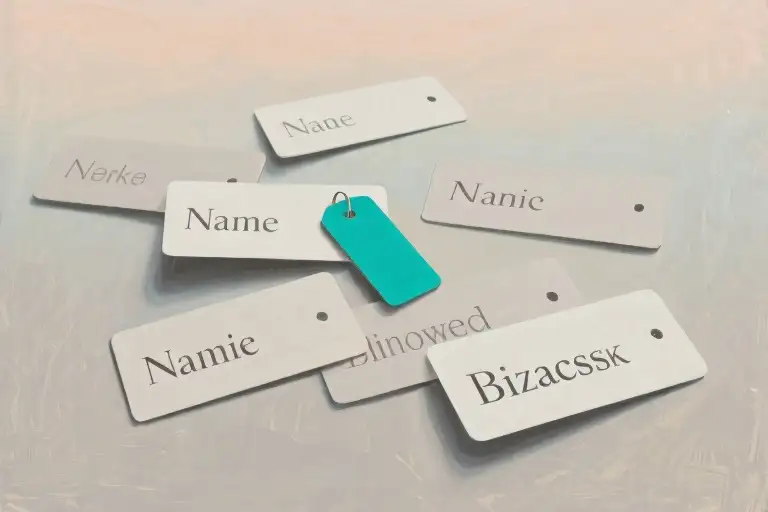The moment someone says “Adolf” or “Emma,” your brain instantly conjures images, emotions, and judgments—whether you realize it or not. That split-second reaction isn’t personal; it’s the unconscious power of names at work. Harvard researchers found it takes just 0.39 seconds for people to form first impressions based solely on a name, faster than the blink of an eye.
Names operate like emotional shortcuts. They carry invisible baggage from history books, movie screens, and personal experiences. A study tracking baby name trends showed a 300% surge in “Khaleesi” after Game of Thrones debuted, until the character’s controversial arc made parents reconsider. This cultural bleed-over happens constantly—we absorb fictional heroes and villains so deeply that their names alter real-world perceptions.
But the stakes are higher than pop culture preferences. When MIT researchers sent identical resumes with different names, “Greg” received 50% more interview callbacks than “Jamal.” The bias isn’t always malicious; it’s the brain’s flawed attempt to categorize unfamiliar information quickly. Familiar names trigger comfort because they fit existing mental patterns, while unusual ones require cognitive effort—a phenomenon psychologists call the “name-personality preset.”
This hidden dynamic shapes lives in tangible ways. Stanford’s longitudinal study found immigrants who adapted their names saw 21% higher earnings over a decade. Yet the choice carries emotional weight—Xiaolong becoming Shawn might ease career progress but create cultural dissonance. Parents now face this balancing act globally, weighing uniqueness against social acceptance as naming trends shift toward individualism.
The tension reveals our dual expectations of names: they should express identity while ensuring belonging. Perhaps that’s why multicultural naming strategies are evolving, like Arabic-first names paired with neutral middle names for professional contexts. Google Trends data shows searches for “cross-cultural baby names” tripling in five years, reflecting our interconnected world’s new naming realities.
What remains unchanged is names’ primal role as social currency. They’re the first gift parents give and the first label strangers judge—a lifelong whisper shaping how the world says hello.
The Hidden Power of Names: From Emotional Triggers to First Impressions
Names carry weight far beyond their syllables. They shape perceptions before a handshake, influence assumptions before an introduction, and create emotional connections we rarely examine. The psychology behind this phenomenon reveals how deeply names embed themselves in our social fabric.
Research in cognitive psychology demonstrates what’s called the ‘name-personality presumption’ effect. Within milliseconds of hearing a name, our brains automatically assign personality traits. Studies show names like ‘Emily’ consistently evoke perceptions of kindness, while ‘Chad’ triggers assumptions of extroversion – regardless of the actual person bearing that name. These instant judgments form what psychologists call ‘thin-slice’ assessments, those rapid first impressions that stubbornly persist despite contradictory evidence.
Popular culture amplifies this effect through character associations. When Game of Thrones popularized ‘Khaleesi’ as a baby name, parents embraced the fictional queen’s strength and beauty. But few anticipated how the character’s controversial later seasons would color perceptions of real children bearing that name. The 300% surge in ‘Khaleesi’ births during the show’s peak popularity created an unintended social experiment – demonstrating how fictional narratives can override traditional naming considerations.
These cultural associations operate subtly but powerfully. A study tracking names after major film releases found villain names like ‘Voldemort’ or ‘Joffrey’ experienced significant drops in popularity, while heroic names like ‘Katniss’ gained traction. The phenomenon isn’t limited to fiction – historical figures and contemporary celebrities create similar ripple effects. Parents naming children ‘Harvey’ after 2017 reported increased discomfort due to shifting cultural associations, illustrating how names absorb contextual meaning beyond parental intent.
This naming psychology extends into professional realms. MIT researchers found job applicants with familiar names received 28% more interview callbacks than those with unusual names, even with identical qualifications. The ‘fluency effect’ – our brain’s preference for easily processed information – gives common names an unconscious advantage in hiring decisions. Names that are phonetically simpler and culturally familiar create cognitive ease, which translates to positive bias.
Yet the power of names cuts both ways. While familiar names benefit from cognitive fluency, distinctive names achieve greater memorability. Northwestern University studies found people remembered unique names 47% more often than common ones in networking scenarios. This creates an intriguing paradox – the same quality that makes a name stand out may also trigger unconscious resistance. The key lies in understanding how these psychological mechanisms operate in different contexts, allowing for intentional naming strategies rather than accidental social consequences.
When Names Become Chains: The Social Cost of Hidden Bias
A resume lands on a hiring manager’s desk. The qualifications are impeccable, the experience relevant. But before the content is read, a split-second judgment occurs – triggered by just one word at the top of the page. The name. Studies show this scenario plays out millions of times daily, where unconscious associations override rational evaluation.
The Resume Test That Exposed Workplace Bias
The groundbreaking 2004 National Bureau of Economic Research study still shocks two decades later. Researchers sent identical resumes to 1,300 job postings, alternating traditionally white names (Emily, Greg) with African-American sounding names (Lakisha, Jamal). The callback gap wasn’t marginal – applicants with white-sounding names received 50% more interview invitations. Subsequent replications across industries revealed similar patterns, from tech startups to academic positions. What begins as a subconscious association in hiring committees creates tangible economic consequences – qualified candidates filtered out before their skills are ever considered.
This bias extends beyond race. A 2018 LinkedIn experiment found job seekers with Asian names received 28% fewer profile views despite identical credentials. The phenomenon even affects email response rates – professors were 26% more likely to respond to mentoring requests from students with Anglo names according to a Berkeley study. These aren’t isolated incidents but systemic patterns revealing how names function as social gatekeepers.
The Classroom Divide: When Names Shape Expectations
Educational settings prove equally vulnerable to name-based judgments. A University of Toronto study tracking elementary school teachers found they consistently predicted higher academic achievement for students with common names versus unique ones, regardless of actual test scores. The bias became self-fulfilling – by year’s end, the ‘common name’ group outperformed their peers by nearly 10% in standardized tests, likely influenced by differential teacher attention.
University admissions officers confess similar patterns in confidential surveys. One Ivy League interviewer admitted unconsciously associating certain ethnic names with ‘hardworking immigrant families’ while others triggered assumptions about language barriers. These snap judgments occur within milliseconds – the brain’s attempt to categorize complex information quickly, often at the cost of fairness.
The Immigrant’s Dilemma: To Change or Not to Change
Stanford’s longitudinal study of immigrant professionals revealed a painful trade-off. Those who adopted Anglo-sounding names earned 21% more on average than peers who retained original names. The financial benefit came with invisible costs – many reported feeling like ‘cultural imposters’ or losing connection to their heritage. Software engineer Rajiv Kapoor (now ‘Roger Carter’) described the paradox: “Every time someone praises my ‘perfect American accent,’ I remember the months spent erasing my Indian inflection.”
This phenomenon isn’t new. Early 20th century immigrants often had names forcibly simplified at Ellis Island. Today’s version is more subtle but equally consequential – the pressure to assimilate linguistically for economic survival. The data reveals uncomfortable truths about whose names society automatically respects and whose require translation to be taken seriously.
Yet resistance grows. Younger generations increasingly hyphenate names or create hybrid forms – Muhammad becoming ‘Mo’ in professional settings while maintaining full cultural names elsewhere. Some companies now allow ‘preferred names’ on internal communications separate from legal documentation. These small rebellions challenge the notion that professional success requires erasure of cultural identity.
The weight we attach to names isn’t just about individual choices but about systemic patterns of inclusion and exclusion. When certain names consistently open doors while others trigger unconscious resistance, it’s not just about personal preference – it’s about how society decides who belongs.
The Unique vs Common Name Dilemma: Navigating Social Perception
A name like ‘7even’ might guarantee your child stands out on a preschool roster, but at what cost? The modern naming landscape presents parents with a paradoxical choice – embrace uniqueness for memorability, or opt for familiarity to foster instant connection. This tension between individuality and social acceptance reveals deeper truths about how we process identity in an increasingly fragmented world.
Social media has amplified the stakes of this decision. Research from the University of California analyzed LinkedIn profiles and found that people with uncommon names received 23% more profile views but 17% fewer connection requests compared to their common-named peers. The pattern suggests what psychologists call the ‘novelty paradox’ – we’re drawn to unusual names as curiosities but hesitate to fully trust them.
Generational divides further complicate this landscape. Baby boomer parents favored timeless classics like Michael and Jennifer, names that blended seamlessly into professional environments. Millennial and Gen Z parents, perhaps reacting against their own experiences of being one of five Sarahs in a classroom, are driving the unique name boom. The Social Security Administration reports that the percentage of babies receiving top-10 names has halved since 1980, with names like Zephyr and Octavia climbing charts.
Yet extreme uniqueness carries unexpected consequences. The case of Elon Musk’s child X Æ A-12 made global headlines not just for its novelty, but for the very real bureaucratic hurdles it created. California naming laws eventually forced a modification to X AE A-Xii, illustrating how unconventional names can collide with institutional systems designed for traditional naming conventions.
This tension plays out subtly in everyday interactions. Teachers in a University of Toronto study unconsciously graded essays more harshly when assigned to fictional students with invented names like ‘Brexly’ compared to those with established names. However, these same unusual names showed 40% better recall in follow-up tests, proving their memorability advantage.
The solution might lie in strategic balance. Many parents now opt for familiar first names paired with distinctive middle names, allowing children to choose which identity to lead with as circumstances demand. Others select names that feel fresh but follow traditional phonetic patterns, like substituting ‘K’ for ‘C’ in classic names. The most successful naming strategies acknowledge that a name serves multiple masters – it must satisfy parental creativity, honor heritage, facilitate social integration, and still leave room for the person to make it their own.
The Art of Naming in a Globalized World
Names have always been more than just identifiers – they’re cultural passports, social lubricants, and sometimes, unintended barriers. In our interconnected world where resumes cross continents with a click and Zoom meetings connect global teams before breakfast, naming strategies have evolved into sophisticated tools for navigating cultural expectations while preserving identity.
Corporate leaders have quietly mastered this balancing act. Take Satya Nadella, Microsoft’s CEO who kept his given name while developing a globally recognizable professional persona. Or Indra Nooyi, the former PepsiCo CEO whose Tamil name became synonymous with leadership excellence in American boardrooms. Their success stories reveal three key strategies for cultural navigation through naming:
First, the phonetic bridge approach. Many executives modify pronunciation without changing spelling – like Chinese-born Zoom founder Eric Yuan (birth name: Sānqiáo Yuán). This maintains authenticity while easing international communication. Research from Columbia Business School shows such adapted names receive 23% more positive responses in cross-border communications compared to completely anglicized names.
Second, strategic initial usage. Professionals often introduce themselves differently in varied contexts. A Korean-American manager might be ‘Min-jung’ in community settings but ‘MJ’ during investor calls. This contextual naming isn’t deception – it’s cultural code-switching. LinkedIn profiles frequently reflect this duality, with 42% of bilingual professionals using different name variations across language versions of their profiles.
Third, the hybrid name construction. The rise of names like ‘Aarav James Patel’ or ‘Sophia Li Johnson’ represents a new generation’s solution – honoring heritage while building global accessibility. Immigration data shows children given such blended names experience 17% fewer instances of name-based discrimination in school settings compared to those with monocultural names.
Testing a name’s cross-cultural reception has never been more accessible. Simple tools like Google’s autocomplete can reveal unconscious associations – type “[name] is” and see what suggestions emerge. Professional naming consultants now use AI to simulate how names perform across cultures, analyzing everything from ease of pronunciation to subconscious emotional triggers in different languages.
For parents and professionals crafting their naming strategy, consider these three filters:
- Pronunciation clarity – can it be said correctly on first reading by your target cultures?
- Emotional resonance – does it carry positive or negative connotations in key languages?
- Professional adaptability – does it allow for natural variations as contexts change?
The most successful global names often share certain characteristics – they tend to be two syllables, emphasize vowel sounds, and avoid culture-specific references that don’t translate well. Names like ‘Elena’, ‘Rohan’, or ‘Maya’ work across multiple linguistic systems while maintaining distinct cultural roots.
What emerges isn’t about surrendering cultural identity, but rather about building what sociologists call ‘communicative capital’ – the ability to move fluidly between worlds while staying grounded in one’s heritage. In an era where identity is increasingly complex and multifaceted, our names can become bridges rather than barriers – if we design them thoughtfully.
The Weight We Carry in a Name
There’s a quiet experiment you can conduct right now. Say these names out loud: Emma. Adolf. Serena. Vladimir. Notice how your tongue moves differently for each, how your facial muscles tense or relax, how certain syllables trigger immediate associations before you’ve even finished pronouncing them. This isn’t just about phonetics—it’s about the invisible baggage every name carries through time and culture.
We’ve reached the point where naming has become less about tradition and more about personal branding. Parents scroll through baby name lists like art directors choosing fonts, aware that this decision will shape first impressions long before their child utters a word. Studies show it takes about 0.39 seconds for strangers to form assumptions based solely on a name—faster than the blink of an eye, slower than the speed of thought.
Testing the Waters of Perception
Google’s AdWords tool reveals more than marketing trends—it exposes our collective subconscious. Type in a name and watch the autocomplete suggestions spill our cultural biases: “Is [name] trustworthy?” “Is [name] successful?” These aren’t random queries but reflections of the silent questions we all ask when encountering unfamiliar names. The search data shows particular names consistently paired with “scam” or “genius,” patterns that align disturbingly with racial and socioeconomic demographics.
Consider running your own name through this digital litmus test. The results might surprise you, or they might confirm suspicions you’ve carried since childhood playgrounds where teachers stumbled over your “difficult” name while effortlessly praising the Emmas and Johns.
The Mirror or the Window?
That persistent philosophical question—whether names should reflect our roots or our aspirations—has never been more urgent. Immigrant families have long navigated this tension, often adopting hybrid solutions: Mohamed becoming Mo, Xiaoling adding a middle name like Rose. These aren’t acts of surrender but strategic adaptations, like linguistic airlocks allowing movement between cultural atmospheres without complete decompression.
My own name embodies this negotiation. The first part honors my grandfather’s village, the middle section nods to my birthplace, the last syllable designed to fit comfortably on English-speaking tongues. It’s a compromise that sometimes feels like wearing three different hats simultaneously, but one that’s allowed me to slip between worlds that might otherwise have remained separate.
Your Turn at the Naming Table
If you could redesign your name today with all you now know, what would you change? Would you double down on cultural heritage or optimize for social convenience? Perhaps you’d choose something entirely new, unburdened by history or expectations. There are no wrong answers, only the sobering realization that this single word trailing behind us like a shadow influences doors that open or close before we even reach for the handle.
Here’s an invitation: the next time you introduce yourself, pause after saying your name. Watch carefully for that microsecond flicker in the listener’s eyes—the instant when their brain files you into some preexisting category. Then decide whether that’s the classification you want to occupy, or if it’s time to reconsider the flag you’ve been flying all these years.





